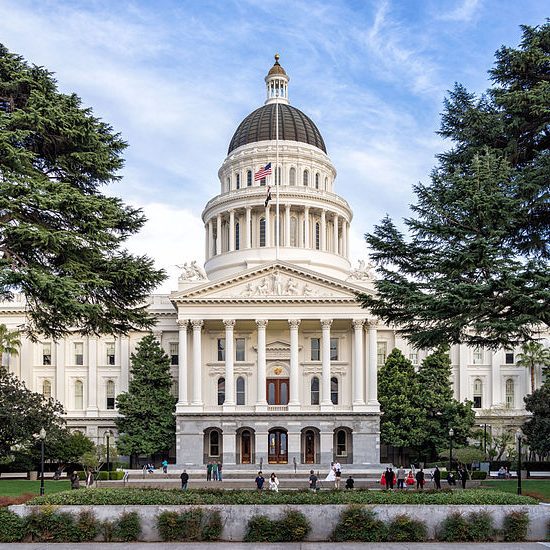
California lawmakers and Gov. Gavin Newsom approved more than a thousand laws this year on topics ranging from environmental regulation to traffic rules. Here’s a look at many new laws that take effect in 2025 that could affect the daily lives of Californians:
Crackdown on retail theft
Newsom and lawmakers approved 11 laws that aim to crack down on theft amid public outrage over robberies at retail stores.
Minimum Wage Increases
The statewide minimum wage for most California workers will increase to $16.50 from $16 per hour next year, thanks to inflationary adjustments in previous law. Higher minimums already took effect for workers in two industries this year: A 2023 law increased it to $20 for most fast-food workers effective April 1. Another one raised the minimum to between $18 and $23 for health care workers (depending on the type of facility) starting Oct. 16 and to $25 for all health care workers over several years. About 25 Bay Area cities also have higher-than-statewide minimum wages, most pegged to inflation, that go up on Jan. 1. A few other cities, including San Francisco, have higher minimums that will adjust on July 1.
‘Captive audience’ meetings
SB399, dubbed the “captive audience bill,” prohibits employers from requiring employees to attend meetings intended to communicate the employer’s opinion about “religious or political matters.” The latter includes elections for political office, legislation, regulation, and the decision to join or support any political party or labor organization. If an employer takes adverse action against an employee who refuses to attend the meeting, the worker can file a civil complaint. “This bill was a big victory for the labor community,” said Joy Rosenquist, an attorney with Littler Mendelson in Sacramento. She added that “not being able to discuss with employees how a new regulation will or would affect your company seems overreaching, impractical and unfair to the business.”
Help for Freelancers
SB988 aims to make sure that independent contractors working for clients in California get timely payment for their work. It requires the “hiring party” to provide the freelancer with a signed, written contract, either physically or electronically, which specifies certain things including both parties’ names and addresses, the services the freelancer will provide, the dollar amount and method of compensation and the due dates for the invoice and payment. Full payment must be made by the due date or within 30 days after the work is completed if no date is specified. Alternatively, the freelancer could create the contract and ask the client to sign it, said Rafael Espinal, executive director of the Freelancers Union. The hiring party means any person, company or organization (except governmental ones) in California that hires a freelancer for $250 or more within 120 days. The law covers self-employed individuals performing virtually all types of professional services, “from writers to yoga instructors to graphic designers,” Espinal said.
An unpaid freelancer can file a civil action, and if the freelancer wins, the client will have to pay the freelancer’s attorney fees and up to double the amount due. This should “apply pressure to the non-responsive client,” Espinal said.
Digital replicas
AB2602 will prevent employers from using AI-generated “digital replicas” of a performer’s likeness or voice as a substitute for a human performer without that performer’s consent, under certain circumstances. It applies to new performances starting Jan. 1 and is not retroactive to digital replicas created or used before that date. It was sponsored mainly by unions representing performing artists.
In addition to the above, the following take effect Jan. 1:
Senate Bill 905 by state Sen. Scott Wiener, D-San Francisco, eliminates the requirement that victims prove their cars were locked to press burglary charges and also makes it easier to combine instances of stolen property possession into one crime.
- Assembly Bill 1779 by Assembly Member Jacqui Irwin, D-Thousand Oaks (Ventura County), lets district attorneys coordinate to prosecute retail theft crimes across multiple counties.
- AB2943 by Assembly Member Rick Chavez Zbur, D-Los Angeles, would crack down on people who possess large quantities of stolen goods that aren’t for personal use and make it easier for police to arrest people for thefts the police didn’t witness. It will also make it easier for prosecutors to aggregate multiple thefts by the same person or people across different counties to reach the $950 threshold for felony theft charges.
- AB3209 by Assembly Member Marc Berman, D-Menlo Park, lets retail stores seek restraining orders against people who steal, vandalize or assault an employee.
- SB242 by then-state Sen. Dave Min, D-Irvine, increases punishments for people who start fires while stealing.
- SB1416 by then-state Sen. Josh Newman, D-Fullerton, increases punishments for large-scale organized retail theft.
- AB1960 by Assembly Speaker Robert Rivas, D-Hollister, increases jail time for people who steal or destroy more than $50,000 worth of property.
- Additionally, Senate Bill 1144 by then-state Sen. Nancy Skinner, D-Berkeley, aims to identify people selling stolen property by requiring more sellers to register their identities with online marketplaces. It’s scheduled to take effect July 1.
- The increased punishments in the laws will come on top of the increased punishments for stealing that voters passed in November through Proposition 36. Currently, thefts under $950 are misdemeanors under California law. But starting Dec. 18, when Prop 36 takes effect, prosecutors will be able to charge someone with two prior theft convictions with a felony for subsequent offenses, regardless of the value of merchandise stolen. The measure will also increase jail time for organized retail theft.
- Legislative leaders tried to insert clauses into the retail theft bills that would have made them inoperative if Prop 36 passed because they said they worried punishments for theft would become too harsh when layered on top of the longer jail sentences allowed for under Prop 36. But they backed down and abandoned that plan amid public outcry.
Legacy admissions
Starting next year, colleges that accept state funding will be banned from giving special consideration to applicants related to alumni or donors. The new law, AB1780 by then-Assembly Member Phil Ting, D-San Francisco, will take effect Sept. 1, 2025, meaning the first class of students affected will start college in fall 2026.
New parking fines for ‘daylighting’ violations
Police will begin fining drivers who park too close to crosswalks under California’s new “daylighting” law, AB413 by Assembly Member Alex Lee, D-San Jose. In an effort to make roads safer for pedestrians and cyclists, the law prohibits people from parking within 20 feet of marked and unmarked crosswalks in most circumstances. Though it has technically been in effect since the start of 2024, cities can start fining drivers Jan. 1.
Fines will vary by jurisdiction. In San Francisco, fines will start at $40 per violation.
Click to cancel
Californians will be able to more easily cancel subscriptions under the state’s new click-to-cancel law, which takes effect July 1. AB2863 by Assembly Member Pilar Schiavo, D-Chatsworth, requires companies that offer automatically renewing and continuous subscriptions to let customers cancel their subscriptions through the same method they used to sign up.
Banking fees
AB2017 by Sen.-elect Tim Grayson, D-Concord, prohibits state-chartered banks from fining customers when they try to withdraw money but have insufficient funds in their account. It takes effect Jan. 1.
Mental health treatment plans
People with severe mental illness who commit violent crimes can be kept in state mental hospitals longer to allow the state to better plan for continued treatment after their release under a new law that takes effect Jan. 1. Assembly Member Matt Haney, D-San Francisco, said he introduced AB2475 in response to a Chronicle column published last year that detailed the circumstances leading up to a Chinatown bakery stabbing. Haney said Mayor London Breed’s office and the San Francisco Department of Public Health sent him the column and asked him to introduce a bill to address the problems it revealed.
Medical debt on credit reports
SB1061 will, starting Jan. 1, prohibit credit bureaus from including medical debt on people’s credit reports. The law by Sen. Monique Limón, D-Santa Barbara, aims to avoid penalizing people for accessing necessary health care.
More details about who’s delivering your food
Food delivery services like Uber Eats and Doordash have become ubiquitous over the past several years. In some circumstances, like if a person lives in a gated complex or is purchasing alcohol, the customer must receive the order directly from the delivery person instead of having it left at their door. Now, customers will have access to a bit more info about the person coming to their home, in order to bolster safety. AB375 by Assembly Member Laurie Davies, R-Laguna Niguel, requires third-party food delivery platforms to provide the customer with the first name of their driver, as well as a photo of that person. It goes into effect on March 1, 2025.
Forced outing in schools
Over the past two years, at least a dozen school districts across California passed policies requiring educators to notify parents if students request to use different pronouns, a new name or otherwise identify as transgender. In response, the Legislature passed AB1955 by Assembly Member Chris Ward, D-San Diego, banning such policies. Though the law doesn’t go into effect until Jan. 1, the passage of the measure didn’t stop at least one district from moving forward with its policy.
New housing – and new crackdowns on cities that don’t build it
- San Francisco’s “doom loop” narrative has made its way to the California Capitol. AB2488 allows San Francisco to create a new downtown financing district. Ting, who wrote the bill, says it offers a two-part solution to the city’s woes by generating economic activity in the wake of the COVID-19 pandemic that decimated the city’s workforce, and lessening the housing supply shortage. Newsom, however, vetoed a separate bill that would have sped up office-to-housing conversions.
- California has seen a boom in accessory dwelling unit construction over the past several years thanks to new state laws easing permitting and construction. Now, SB1211 by Skinner could ramp things up even further: The law increases the number of ADUs allowed on multifamily properties that can be approved quickly.
- As the state has faced its crippling housing crisis, it has passed numerous laws cracking down on cities that don’t do their part to accommodate and build more homes. SB1037 by Wiener gives the attorney general power to impose penalties on local governments that violate certain state housing laws, including fees of up to $50,000 per month and the costs of prosecuting the case in court.
-
More benefits for California workers
- As climate change-fueled wildfires and extreme weather continue to worsen, lawmakers have sought to protect workers impacted by hazardous conditions. SB1105 by Sen. Steve Padilla, D-Chula Vista, allows agricultural workers to use paid sick days for preventive care, in the event that extreme heat, smoke or other natural hazards would make working outdoors dangerous. Newsom vetoed, however, a bill that would have allowed farmworkers to file worker’s compensation claims for heat-related illnesses suffered while working.
- Thanks to AB2123 by Assembly Member Diane Papan, D-San Mateo, it will no longer be legal for employers to require employees to use up accrued vacation time before they can access their benefits under California’s Paid Family Leave program. The program allows workers to take paid time off in order to care for a sick family member or bond with a new child.
MORE INFO ON STATE LAWS FROM THE SF CHRONICLE.
HERE’S ARE OTHER NEW LAWS IN EFFECT IN 2022, PER CAL MATTERS AND THE SAN FRANCISCO CHRONICLE.

